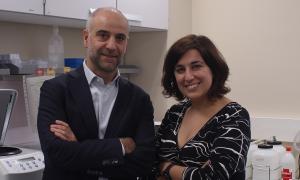Second case of drug-free long term HIV remission in the world

'Nature' reports the case of a patient who underwent a stem cell transplant for lymphoma and has been in HIV remission for 18 months despite antiretroviral therapy interruption. The University College of London led the study with IrsiCaixa participation.
Nature journal publishes the case of an HIV-infected adult who underwent a stem cell transplant to treat Hodgkin’s Lymphoma and has been in viral remission for 18 months in absence of antiretroviral treatment (ART). It is the second case in the world, after the Berlin Patient in 2009. Since then, all the cases of ART interruption following a stem cell transplant resulted in HIV rebound within the first year. The study has been led by the University College London and has been carried out within the framework of the international consortium IciStem, coordinated by IrsiCaixa AIDS Research Institute (Barcelona) and the University Medical Center of Utrecht (The Nederlands). IrsiCaixa, promoted by “la Caixa” and the Ministry of Health of the Government of Catalonia, is the only Spanish center to participate in this work.
The patient was HIV positive since 2003 and was diagnosed of a Hodgkin's lymphoma in 2012, the reason why he underwent a stem cell transplant in 2016. Donor cells had a mutation, CCR5 Delta 32, which prevents viral entry in CD4 T lymphocytes. After 16 months, doctors interrupted ART and today, 18 months later, virus remains undetectable in their blood. Usually, when HIV+ individuals stop treatment, virus rebounds within the first 4 weeks.
Thus, this is the second case of long-term HIV remission in the world. “This report demonstrates –says Javier Martínez-Picado, ICREA professor at IrsiCaixa, co-leader of IciStem consortium and co-author of the study– that the Berlin Patient was not an isolated case and it is possible to achieve a total remission of HIV”. “Even so, we do not want to talk about cure yet, but the truth is that a year without viral rebound is something that had not been seen since the Berlin Patient, so our vision is very optimistic,” he adds. The results are presented on Tuesday at the Conference of Retroviruses and Opportunistic Infections (CROI), in Seattle, same day as the publication in Nature.
“We have analysed HIV levels in plasma and it is undetectable even using the most sensitive techniques” explains Maria Salgado, IrsiCaixa researcher and co-author of the study. In 2014, the Essen Patient received a transplant with the CCR5 Delta32 mutation, but when ART was interrupted, HIV quickly rebounded. In 3 other cases of stem cell transplant, without the CCR5 Delta 32 mutation, virus rebounded at week 12, 32 and 41, respectively.
Differences and similarities with the 'Berlin Patient'
Nature's paper highlights differences with the Berlin Patient. While his original cells partially presented the CCR5 Delta 32 mutation, the current patient did not. In addition, the case of Nature underwent a much less aggressive pre-transplant therapy and received a single transplant, when the Berlin Patient underwent two consecutive transplants. According to the researchers, this demonstrates that remission can be achieved even without having a previous mutation in the recipient and with much less aggressive drug regimens.
There are also coincidences between both patients. Both received a transplant with the CCR5 Delta 32 mutation, presented a mild graft-versus-host disease (a common situation after transplant, in which donor cells attack recipient cells) and full-donor chimerism was achieved from day 30. A previous study led by IrsiCaixa, published in October 2018 in Annals of Internal Medicine and also carried out within the framework of IciStem, already pointed out that these other factors, besides the CCR5 Delta 32 mutation, could be decisive to achieve viral remission. “Studying these other mechanisms could allow us to design less invasive HIV cure strategies that might be scalable to a large majority of the HIV+ population, and not only to those who suffer from a haematological disorder,” says Salgado, first author of this previous article.
Funded by The Foundation for AIDS Research, amfAR (USA), IciStem has studied 38 HIV transplanted patients since 2014, whom underwent a stem cell transfer due to a blood disease in all cases.
Researchers highlight that stem cell transplantation is a high-risk medical procedure and is only recommended in life-threatening haematological conditions. They also emphasize that ART interruption can only be performed under medical supervision.